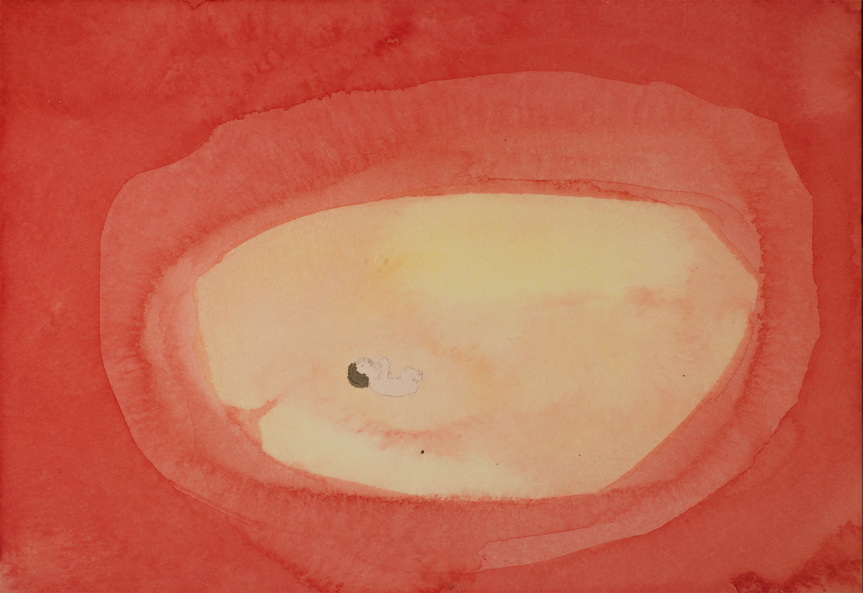-
From Current Issue
-
- Editor’s Letter Fire in the Heart
- Reviews I Gusti Ayu Kadek Murniasih
- Reviews 11th Seoul Mediacity Biennale: “One Escape at a Time”
- Dispatch Networked China
- One on One Monira Al Qadiri on Yukio Mishima
- Essays The rise of independent art spaces in pandemic-era Shanghai
- Features Tuan Andrew Nguyen
- Table of Contents
- Web Exclusives
- Archive
- Subscribe

R
E
V N
E
X
T
Installation view of SARA SEJIN CHANG (SARA VAN DER HEIDE)’s Four Months, Four Million Light Years, 2020, multimedia film installation: 35 min, at ARGOS Centre for Audiovisual Arts, Brussels, 2021. Photo by Isabelle Arthurs. All images courtesy the artist.
Sara Sejin Chang (Sara van der Heide): “Four Months, Four Million Light Years”
Sara Sejin Chang (Sara van der Heide)’s film installation Four Months, Four Million Light Years (2020), shown at the ARGOS Centre for Audiovisual Arts as part of this year’s Kunstenfestivaldesarts, intersects the malpractices of the transnational adoption industry with the legacies of Western imperialism. An adoptee herself, the Brussels-based Korean-Dutch artist was inspired by a 1692 colonial print by Dutch statesman Nicolaes Witsen, Een Schaman ofte Duyvel-Priester (Shaman or Devil’s Priest from the Tungus), one of the first Western visual representations of a Eurasian shaman. Chang traveled to and filmed the site depicted in the print, using it as the key imagery around which the other visual elements pivot to make this work a healing meditation on shamanic and ancestral connection as a challenge to colonial exploitation and erasure.
For Chang, the print represents the colonial image/narrative regimes at the roots of the “myth” surrounding transnational adoptions: that people of color are inferior and hence deserve to be rescued and civilized by Western adopters. In the film, well-chosen archival images of uniformed American soldiers holding Korean children in their arms and adoptees being pampered by White crew members on West-bound aircrafts may appear to radiate benevolence, but the artist’s voiceover calls out the hypocrisy of the White savior narrative and exposes their true condition as transported goods. Chang’s narration also points to how the conditions for the boom in Western adoptions of Korean children were created by the Korean War (1950–53), during which thousands of mixed-race illegitimate children were fathered by American soldiers.
By the 1970s, when international demand for Korean adoptees was at its peak, children were being stolen from hospitals, childcare centers, and directly from their mothers in busy marketplaces. This resulted in the introduction of an anti-trafficking law in South Korea that mandated that a child must have stayed in an orphanage for a minimum of four months before they would become eligible for legal adoption, ostensibly so that birth parents would have enough time to find and claim their children. In reality abductions still took place with the complicity of orphanages, hospitals, police, and other institutions that stood to gain from the transnational adoption industry.
Chang alternates between a documentary-style use of archival imagery accompanied by voiceover, and a non-narrative, “shamanic” mode of address involving shots of subtly interlayered watercolors to a soundtrack of chanting and drumming. Among other symbols, the paintings depict circular receptacles representing the Korean wombs from which the babies came and have been forcibly separated. The artist puts forward shamanism as an alternative mode of knowledge whereby one is able to traverse space and time and connect to ancestral spirits, a power that counters the Western rationalist models of knowledge advocated by the colonial project as well as the exploitative mobility that separates commodities from their roots under global capitalism. The shamanic symbols that appear in the film extend to the exhibition environment, with a fabric hanging depicting circular shapes representing the sun and the moon. These motifs are again emblematic of the inseparable bond between a mother and child, and are also used in Chang’s ongoing project The Mother Mountain Institute (2017– ), which seeks to identify birth mothers of Korean adoptees.
Cautious not to feed into the sensationalism so often found in media coverage of separated children and mothers, Chang maintains that Four Months is not about her own experiences as an adoptee but about the systemic issues surrounding transnational adoption. However, the work remains inflected by the artist’s personal history through the use of own voice and image. She attempts to distance herself at one point in the video when outlining six types of violence experienced by non-White adoptees she had interviewed across Europe by having a male voice narrate the segment alongside her, but the artist’s presence still remains. The film also includes several partial and full mug shots of the artist to emphasize the negative scrutiny faced by non-White adoptees who are constantly reminded of their “foreign” appearance in White-majority countries despite having grown up there.
Chang’s intricately layered work is powerful for the way it exposes the traumas associated with the shady business of interracial adoption without victimizing the children involved, instead empowering them through truth-telling and new modes of ancestral connection.
Installation view of SARA SEJIN CHANG (SARA VAN DER HEIDE)’s Four Months, Four Million Light Years, 2020, multimedia film installation: 35 min, at ARGOS Centre for Audiovisual Arts, Brussels, 2021. Photo by Isabelle Arthurs.
Sara Sejin Chang (Sara van der Heide)’s “Four Months, Four Million Light Years” was on view at the ARGOS Centre for Audiovisual Arts, Brussels, from May 15 to July 18, 2021.
To read more of ArtAsiaPacific’s articles, visit our Digital Library.













